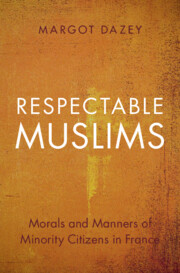Book contents
- Respectable Muslims
- Cambridge Studies in Social Theory, Religion, and Politics
- Respectable Muslims
- Copyright page
- Contents
- Acknowledgments
- Note on Transliterations and Translations
- 1 The (Un)Making of Respectability
- 2 Proving Frenchness
- 3 Allaying Suspicions
- 4 Keeping Order
- 5 Practicing Discreetly
- 6 Uplifting the Community
- 7 Facing Hostility Graciously
- 8 Respectable Citizens in Uncertain Environments
- Bibliography
- Index
2 - Proving Frenchness
Loyal Muslims in a Globalized World
Published online by Cambridge University Press: 18 December 2024
- Respectable Muslims
- Cambridge Studies in Social Theory, Religion, and Politics
- Respectable Muslims
- Copyright page
- Contents
- Acknowledgments
- Note on Transliterations and Translations
- 1 The (Un)Making of Respectability
- 2 Proving Frenchness
- 3 Allaying Suspicions
- 4 Keeping Order
- 5 Practicing Discreetly
- 6 Uplifting the Community
- 7 Facing Hostility Graciously
- 8 Respectable Citizens in Uncertain Environments
- Bibliography
- Index
Summary
The second chapter traces the trajectories of Muslim leaders of the UOIF, leading them from North African middle-class families to the uneasy condition of Arab foreigners in France. Despite obtaining French citizenship, their status remains vulnerable, with state authorities and political elites regularly questioning their national loyalty. Owing to the intense scrutiny and suspicion, French Muslim leaders tend to engage in various practices of “Frenchification.” These practices consist of distancing themselves from homeland politics, providing evidence of cultural (notably linguistic) integration, and promoting a form of “pure Islam” that is detached from their homeland traditions. The chapter demonstrates that proving Frenchness is irreducible to legal status and implies nourishing a specific set of emotions, such as national pride, feelings of belonging, and a “love” of France. These expressions of emotional attachment can be understood in light of the emotionalization of citizenship that now characterizes the politics of belonging in Western Europe. However, such credentials of membership are not socially neutral; rather, they are layered with class considerations and can, in some cases, feed into anti-migrant sentiments against less privileged coreligionists, whom they regard as insufficiently French.
Keywords
- Type
- Chapter
- Information
- Respectable MuslimsMorals and Manners of Minority Citizens in France, pp. 34 - 64Publisher: Cambridge University PressPrint publication year: 2024

